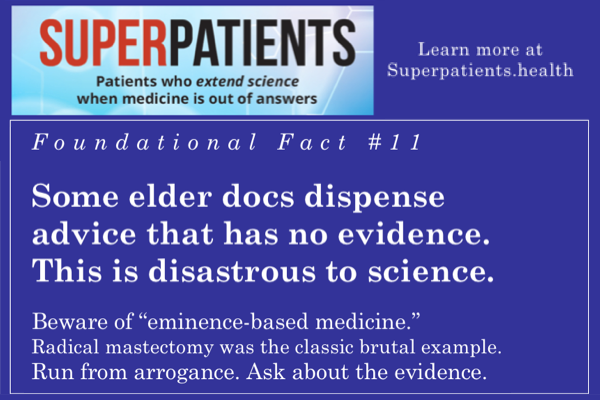This truth makes a lot of people uncomfortable, but it’s essential for superpatients to understand.

Next in the series of fourteen foundation truths about Superpatients.
After my cancer my earliest work in learning about medicine was about evidence-based medicine. Not long after, someone told me about the opposite: “eminence-based medicine,” in which people look not to evidence but to whoever is considered the leading authority.
That’s not a joke. It’s profoundly unscientific, but a reality. I’ll give you just two examples, one a century ago and one a few years ago, with the same bottom line:
Beware anyone who behaves arrogantly
if you ask a reasonable question.
Even a doctor. Even a good doctor.
Superpatients is about extending science, which is why this series began with discussing what good science is, and that not all published science is good science. Today’s entry is about another nasty reality: some people in positions of authority don’t realize that all science is uncertain (as I blogged in 2017), so what was thought best might not be best.
“Uncertain” means it’s open to question (always, without exception) and subject to updates and corrections (as shown by the extraordinary book The Half-Life of Facts). Personally I learned this in eighth grade science, but some medical authorities try to bludgeon people into blind acceptance.
Run from those people. It’s not just that they’re mean; they’re wrong about being right, which is a supreme irony.
Example 1: Radical mastectomy
Radical mastectomy was a brutal surgery promoted by Johns Hopkins surgeon William Halsted. The idea was that if breast cancer recurred, then we must not have chopped out enough of the woman’s body. So he and his followers cut more, and more, and more, treating it like an infection that was spreading. The surgery was permanently disfiguring and painful.
There was never any evidence that it did any good.
Let that sink in.
Yet “radical mast” became such orthodoxy (“everyone knows this is the only treatment a responsible doctor should prescribe”) that in the 1970s when someone tried (for the first time!!) to compare radical mastectomy with other methods,
Immersed in the traditions of radical surgery, many American surgeons put up such formidable barriers to patient recruitment that Canadian surgeons and their patients were added to complete the study. … it still took years to recruit adequate numbers. Crippled by forces within surgery itself, the NSABP-04 trial barely hobbled to its end.
Mukherjee, Siddhartha. The Emperor of All Maladies: A Biography of Cancer (pp. 200-201). Scribner. Kindle Edition.
(If you have the stomach for it, Mukherjee’s discussion of it in Emperor of All Maladies is powerful.)
One group in the study got radical mastectomy; another got simple mastectomy (no cutting away of surrounding chest muscles etc); another got mastectomy plus radiation. Here’s the grotesque punch line:
“The rates of breast cancer recurrence, relapse, death, and distant cancer metastasis were statistically identical among all three groups.” No benefit.
Today we know that cancer does not spread through surrounding tissues like an infection. So let this sink in: amid their arrogance and certainty, they didn’t even know what they were doing.
Halsted was in fact a great surgeon. Among other things he invented the idea of surgical residency in medical education. But even greatness doesn’t shield someone from being wrong … or arrogant.
Example 2: “How dare you!”
A few years ago on the blog of Dr. Bob Wachter, an angry physician left this comment:
I was licensed to practice medicine 38 years ago. How dare you suggest I don’t know what I’m doing?
Think carefully about this – understand the guy’s point of view: when he finished medical school in the 1970s, he was obviously told that he was ready for a lifetime of service … but nobody warned him that science might evolve (or he didn’t listen), and obviously he never realized that he might someday be wrong.
I hesitate to generalize, but I say “some elder docs” because in my experience – including personal attacks I’ve experienced at some speeches – this attitude comes from more “senior” physicians. (In 2012 a senior physician from Barnes Jewish Hospital (the “Mass General” of St. Louis) practically spat at me – on the panel after my speech he looked at me in the audience and said, “If you want to know who the best surgeon is, I’ll tell you – don’t get that from some blog!”)
The superpatient takeaway
Scientific knowledge is always subject to question, verification, exploration. If best available treatments aren’t working, it’s entirely reasonable to explore for more. Run from anyone who accuses you of questioning their authority, because, ironically, they don’t know what they’re talking about.


When I entered medical school, on our very first day the most eminent eminence (The Dean) told our class that within 10 years of finishing medical school, 1/2 of what we had learned would no longer be true. But no one could tell us in advance which half.